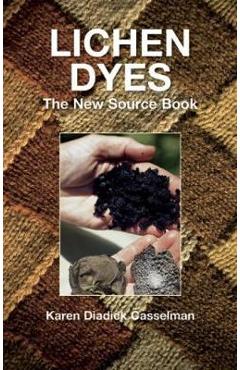Lichen Dyes

Detalii Lichen Dyes
Vânzător
libris.ro
Pret
55.52 Lei
55.52 Lei
61.69 Lei
Categorie (vânzător)
Art
Marca
Karen Diadick Casselman
Descriere YEO:
Descriere magazin:
Lichens are curious plants, composed of fungi and algae that often resemble splotches of paint peeling from rocks or wood. They have been used to create brilliant, versatile dyes for over 4,000 years. In this comprehensive guide based on 25 years of meticulous research, noted textile designer and lichen expert Karen Casselman explains how to create and use dyes derived from these unusual plants. The text begins with a fascinating history of such Asian and European lichen pigments as Phoenician purple, Roman murex, Florentine orchil, and Norwegian korkje. Consideration of Scottish, Irish, and Scandinavian domestic lichen dyes follows, as well as those used in colonial America. Also discussed at length are safe dyeing methods, with special attention to equipment and preparation of the fiber; ecologically sound dyeing techniques and the use of mordants (substances used to fix dyes); lichen identification; and more. A final section includes charts of lichen dye names and ingredients, additives and alternative mordants, international field guides, useful bibliographies, indices, and other information. Well written, informative, and filled with expert advice, this excellent guide will be indispensable to novices and experienced dyers who wish to learn the age-old art and craft of dyeing with lichens.

Lichen Dyes - Disponibil la libris.ro
Pe YEO găsești Lichen Dyes de la Karen Diadick Casselman, în categoria Art.
Indiferent de nevoile tale, Lichen Dyes din categoria Art îți poate aduce un echilibru perfect între calitate și preț, cu avantaje practice și moderne.
Preț: 55.52 Lei
Caracteristicile produsului Lichen Dyes
- Brand: Karen Diadick Casselman
- Categoria: Art
- Magazin: libris.ro
- Ultima actualizare: 28-10-2025 01:22:05
Comandă Lichen Dyes Online, Simplu și Rapid
Prin intermediul platformei YEO, poți comanda Lichen Dyes de la libris.ro rapid și în siguranță. Bucură-te de o experiență de cumpărături online optimizată și descoperă cele mai bune oferte actualizate constant.
Descriere magazin:
Lichens are curious plants, composed of fungi and algae that often resemble splotches of paint peeling from rocks or wood. They have been used to create brilliant, versatile dyes for over 4,000 years. In this comprehensive guide based on 25 years of meticulous research, noted textile designer and lichen expert Karen Casselman explains how to create and use dyes derived from these unusual plants. The text begins with a fascinating history of such Asian and European lichen pigments as Phoenician purple, Roman murex, Florentine orchil, and Norwegian korkje. Consideration of Scottish, Irish, and Scandinavian domestic lichen dyes follows, as well as those used in colonial America. Also discussed at length are safe dyeing methods, with special attention to equipment and preparation of the fiber; ecologically sound dyeing techniques and the use of mordants (substances used to fix dyes); lichen identification; and more. A final section includes charts of lichen dye names and ingredients, additives and alternative mordants, international field guides, useful bibliographies, indices, and other information. Well written, informative, and filled with expert advice, this excellent guide will be indispensable to novices and experienced dyers who wish to learn the age-old art and craft of dyeing with lichens.
